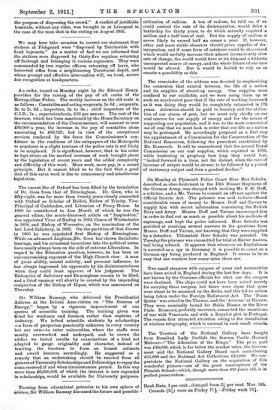The remainder of the address was devoted to emphasizing the
connexion that existed between the life of a nation and its supplies of stored-up energy. Our supplies were confined to our coalfields, and we were using them up at such an accelerated pace that if the rate of working increased as it was doing they would be completely exhausted in 175 years. Attention should be paid to forestry and the utiliza- tion of our stores of peat, but we must rely chiefly on our coal reserve for our supply of energy and for the means of supporting our population, and it was to the more economical use of coal that we must look in order that our life as a nation may be prolonged. He accordingly proposed as a first step the appointment of a Commission for the Conservation of the National Resources, following the precedent established by Mr. Roosevelt. It will be remembered that the second Royal Commission on our coal supplies, which reported in 1905, while hesitating to prophesy how long they would last, "looked forward to a time, not far distant, when the rate of increase of output would be slower, to be followed by a period of stationary output and then a gradual decline."






































 Previous page
Previous page